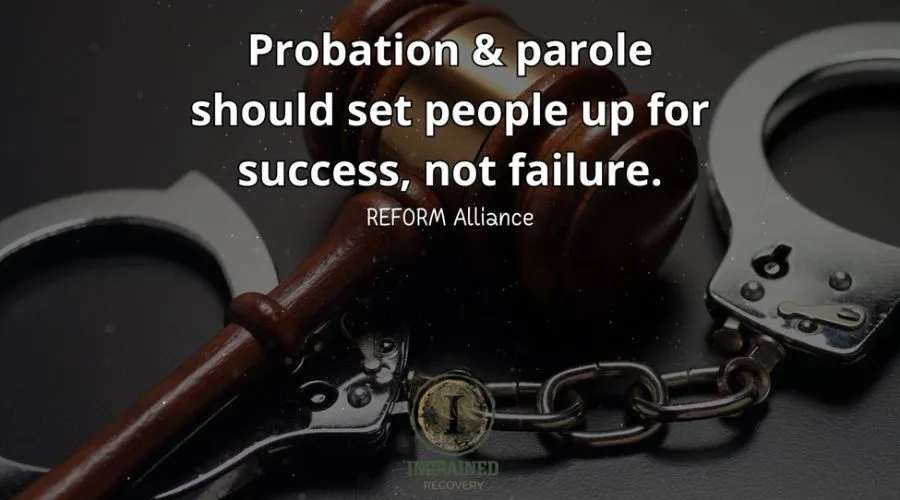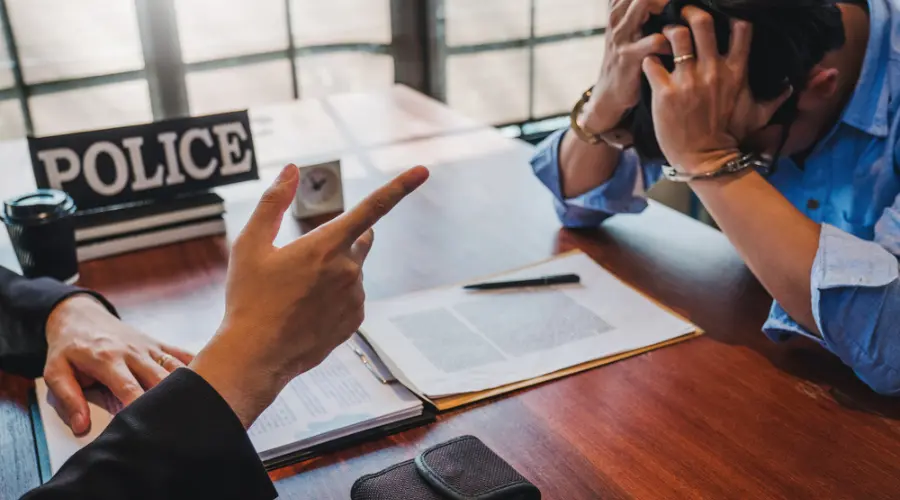A Resource and Guidance on Attending Rehab While on Probation
If you or a loved one is attempting to complete probation successfully and struggling, there is effective help that can make a difference. The problem is that many people think attending treatment while on probation is not possible.
The core question then becomes: Can you go to rehab on probation in Georgia? And the answer is, in most cases, absolutely, yes!
Ingrained Recovery is an upscale rehab facility in Eastman, Georgia, about 2 hours from Atlanta. Although we are a 50-acre drug rehab center, we are not immune to drug-related crimes. Even small towns have seen an increase in drugs and addiction.
We support programs that allow a non-violent offender to get help with substance abuse instead of prison time.
Like many states, Georgia offers court-ordered rehab program offerings and other mental health treatment options. Keep reading to learn what we know about how a treatment program can help stop people from re-offending and get addicted individuals the treatment they need.
Get Proven Rehab Options at Ingrained
Find Help At Ingrained Recovery
Who Qualifies for Court-Ordered Rehab and Probation Instead of Incarceration?
The Georgia Department of Community Supervision and Georgia courts must follow specific guidance when considering someone for court-ordered treatment.
Legal considerations and probation conditions play a significant role in determining eligibility, as individuals must meet certain requirements to qualify for court-ordered rehab. They include:
- Non-violent crimes: Misdemeanors or felonies must be non-violent. Possession of a controlled substance falls under this guideline in many cases.
- First-time offenders: Those without a past criminal history are more likely to receive a recovery program after a drug offense than someone who has had past opportunities at probation or parole and then re-offended. Prison inmates are a poor influence on those without a criminal past; placing someone at a treatment center for help makes them less likely to offend again. But prison time makes them more likely to become entangled in the legal system.
- Alcohol/drug abuse or mental health issues: Those whose crimes are a direct result of drug use, addiction, or other mental health concerns often receive an order to attend rehab. A judge will view this opportunity as a chance to change their behavior by providing access to treatment specialists.
- Willingness to participate in addiction treatment: Those selected for drug addiction treatment and parole programs must want to work on changing for the better. In many cases, individuals may be required to attend addiction treatment or attend court-ordered rehab as part of their probation rules. If they resist learning new life skills, they cannot heal from their drug abuse.
- The Judge’s discretion about an individual situation: In some cases, judges can use discretion to order drug addiction treatment instead of jail at the person’s court date. They’ll look at case specifics, the benefits of rehabilitation, and any further information they find relevant. Attending treatment at an approved rehabilitation program is often a key factor in the judge’s decision.
Offenders must meet these guidelines to qualify for court-ordered rehab instead of serving jail time. The probationary period often includes requirements to participate in rehabilitation programs or treatment programs as part of the legal process.
What is the Role of Probation Officers in the Rehab Process?
Probation officers are essential partners in the rehab process for those seeking to attend rehab while on probation. Their main role is to ensure that probationers comply with all the terms of their probation, which often includes participating in a rehab program at a licensed rehab facility.
Probation officers maintain regular communication with both their probationer and the rehab facility to monitor progress and address any issues that may arise during the recovery process.
Throughout the rehab while on probation, probation officers conduct scheduled check-ins to discuss the treatment plan, offer guidance, and help resolve any challenges related to attending rehab. They may also collaborate with the treatment team to adjust the treatment plan as needed, ensuring it aligns with probation requirements and supports the individual’s recovery goals.
In addition to monitoring compliance, probation officers can connect their charges with additional resources, such as job training, housing assistance, or support groups, to help them build a stable foundation for long-term recovery.
At Ingrained Recovery, our caring team will work hand in hand with your PO to help fulfill any requirements quickly and completely.
Can You Go To Rehab While on Probation? Four Benefits of Choosing Substance Abuse Treatment Over Jail

Entering rehab instead of going to prison after a drug-related crime can have a positive impact on staying sober, housing, employment, and healthy relationships. Accessing rehab services at a rehabilitation facility can provide the support needed to complete probation successfully and move forward in recovery.
Here is how attending rehab court-ordered (or voluntarily) while on probation or parole can help:
1. Going to a Rehab Facility Reduces Chances of Becoming a Re-offender
Rehab programs address the root causes of legal issues, such as mental illness and childhood trauma. When people learn more about these underlying factors, they can develop the resilience tools to learn to overcome them healthily. That means no reliance on drug use.
2. Court-ordered Drug Rehab Builds Life Skills
Some of Georgia’s rehab program centers also offer vocational or educational opportunities. They graduate sober and with the skills needed to obtain a good job, health insurance, and participate in society.
3. Less Stress on the Probation Officer
Probation officers and parole departments both have very stressful jobs. Many probation officers actively support their clients’ participation in treatment and recovery programs. They enjoy seeing the treatment progress firsthand. Many express a sense of joy when they see program graduates complete probation with more self-esteem and free of drug addiction.
4. Avoids Overwhelming the Legal System
The drug abuse crisis in Georgia has put tremendous strain on the entire legal system, from overworked public defenders and prosecutors to judges and court clerks.
Allowing someone to go to rehab while on probation frees up the system to focus on more severe crimes, such as domestic violence, human trafficking, or other gang activity.
Georgia Probation and Parole Addiction Treatment Program Options

Before digging into this section, let’s explain two terms that may be unfamiliar to some.
A probation period is a set time during which someone has appeared before a judge and avoids jail time by completing specific steps. These can include seeking addiction treatment at a licensed rehab center, community service, or maintaining gainful employment.
For those who need financial assistance, a state-funded rehab center may be an option to help meet these requirements.
A probation officer is one of many types of police officers. In this case, they supervise the progress of people who receive a probation sentence. Probation officers often use drug testing to monitor compliance with sobriety and treatment requirements.
Failure to comply with treatment or probation requirements, such as missing mandatory sessions or failing drug tests, can result in probation revocation and severe consequences, including possible jail time.
Effective Treatment for Parole Clients in Georgia
On the other hand, parole is when someone has already served at least part of a jail sentence. However, they may qualify for an early release for certain reasons. They submit to parole supervision. Like probation, parole means complying with clearly defined rules.
It usually means no failed drug test results, community service or employment, or attending community-based 12-step programs or group therapy.
Georgia’s programs are designed to be very flexible. In some cases, programs may serve the probation or parole needs of the GA courts.
Two of the most utilized programs are:
- Day Reporting Centers (DRCs): These centers provide counseling and education and help probationers avoid relapse once they are clean and sober.
- Residential Substance Abuse Treatment (RSAT) Programs: Whether on probation or parole, this treatment center option offers more intensive support for the highest-risk parolees or probationers. The treatment center supports alcohol or drug rehab, helps prevent relapse, and helps offenders learn the life skills that will keep them sober after leaving the rehab program.
Those with no prior criminal record and access to private insurance or group health insurance may plead to go to rehab centers of their choice. Some judges grant this request, especially on lower-level offenses.
They understand that sober people access better things later in life – and that the desire to do better can be a deterrent to future criminal behavior.
What Happens if a Probation Violation Occurs in Georgia?

Several things may happen when rehab-while-on-probation violations occur. The probation or parole officer must report the rehab program/probation violation to the court for a hearing. The outcomes may vary:
For a technical violation, such as forgetting an appointment with the probation officer or missing a payment on a fine, the probationer usually receives a warning or reprimand. On a second technical violation, the court may add more restrictions to the conditions of the person’s probation.
If a more severe violation occurs, such as committing another crime or participating in gang activity, the court will revoke the probation or parole. That means a return to the original sentence or even added jail time.
Judges have great latitude. They may add fines, community service hours, or mandate a return to a treatment facility, especially if the probation violation ties back to a relapse.
Up To 100% of Rehab Covered By Insurance
Find Help At Ingrained Recovery
Call Ingrained and Get Effective Support to Complete Probation Successfully
If you or a loved one is trying to avoid jail and is asking for rehab while on probation, we can help. Seeking treatment is always a brave step, and we will be glad to coordinate check-ins with a probation or parole officer while at our treatment facility.
You will do more than “go to rehab” at Ingrained. You’ll learn the causes of your addiction and receive evidence-based treatment to heal it. You’ll also learn the secrets of relapse prevention and how to have a clean, safe, sober life. You’ll not need to worry about whether you’ll pass the next probation board drug test – with our help, you’ll pass every drug test with flying colors.
Call Ingrained Recovery today for help with rehab while on probation. All calls are confidential, so please reach out for support today!

